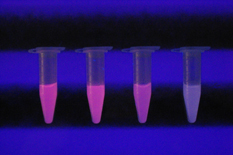 |

|
 |
Hydrogels |
|
The Fischell Department of Bioengineering research group is the first to use molecular imprinting to capture viruses. The patented technology shows promise in treating the H5N1 virus, the cause of the avian flu. It may also lead to new treatments for diabetes and more reliable vaccines. The concept shows great promise for a number of health care advances.
Called a "virus sponge," Professor Kofinas uses an inexpensive hydrogel to make an imprint of the target molecule and trap it as blood flows through the hydrogel. Kofinas sees a variety of cost-effective uses for the technology. He envisions machines similar to dialysis being used to remove viral infections from blood. Hepatitis and HIV could also be filtered from the blood.
Beyond viruses, Kofinas sees molecular imprinting being used in drugs and food additives to make life easier for diabetics by removing glucose. He also suggests using the technology in masks or protective clothing to prevent exposure to harmful biological agents.
May 8, 2007
|